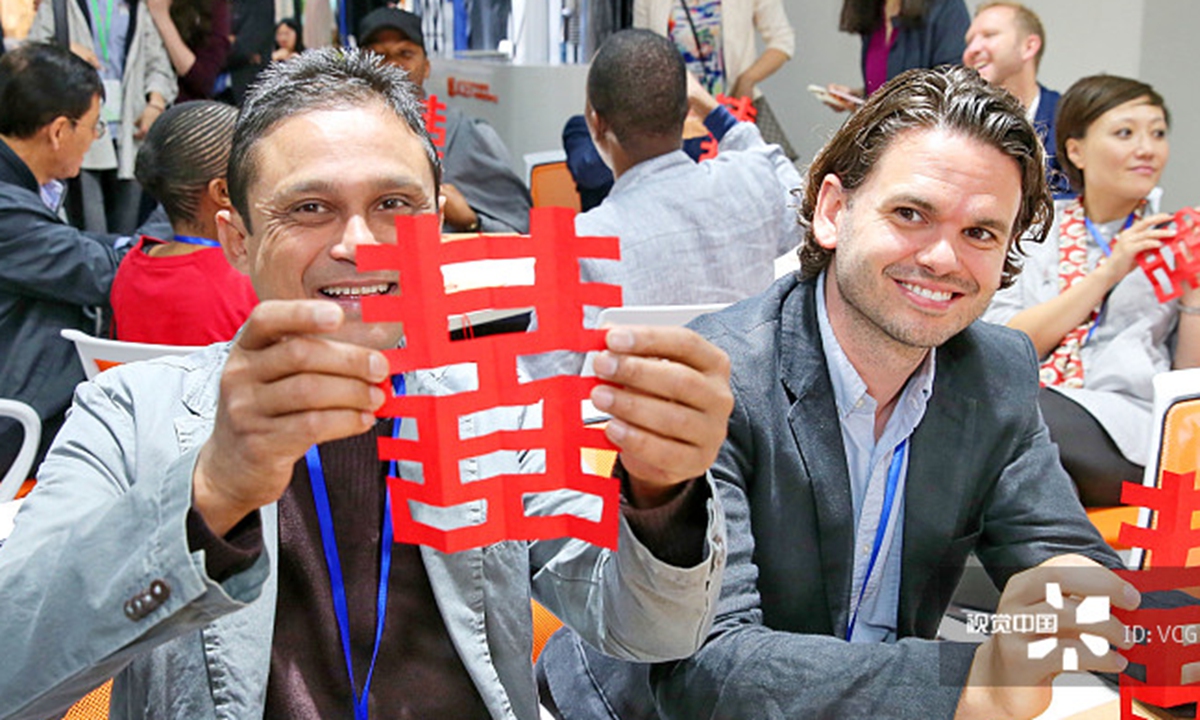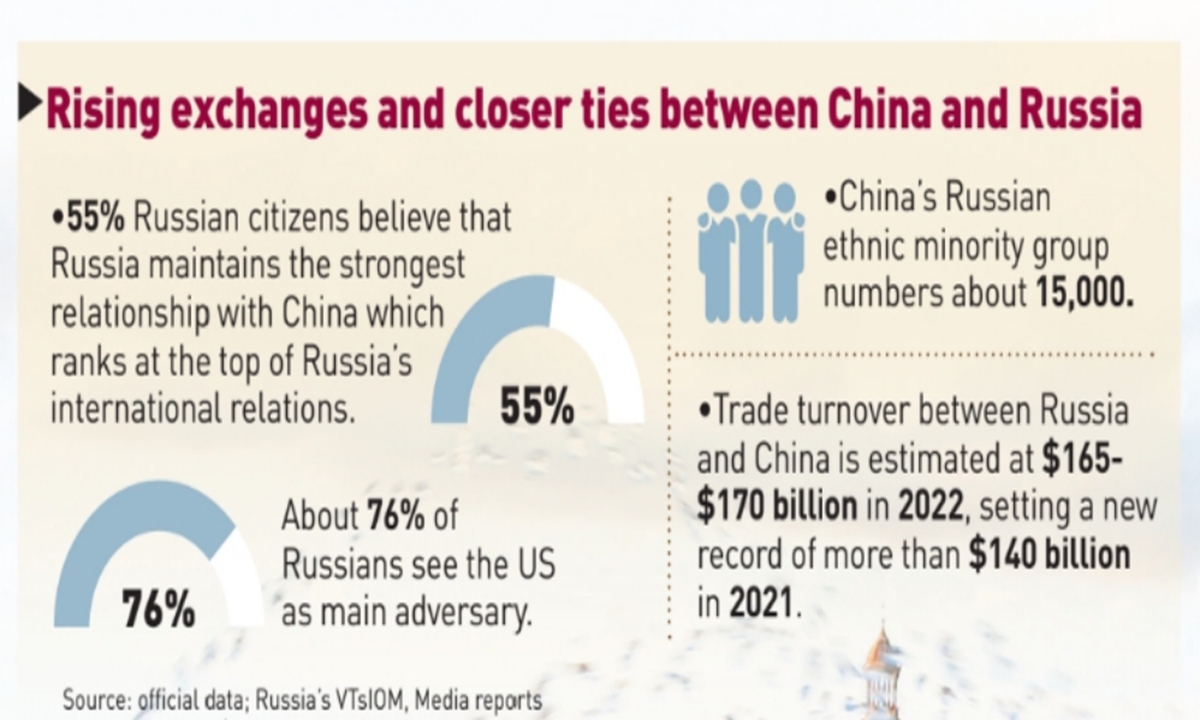IN-DEPTH / IN-DEPTH
Chinese language fever, China-made boom, hot sale of Russian delicacies – Chinese-Russian civilian affinity climbs to new heights amid strengthening strategic ties
Stronger bridge

A tourist area featuring matryoshka in Chinese border city Manzhouli Photo: VCG
Russia's latest surveys show that China is considered to be Russia's closest friend by more than half of the Russian population, and Russian enthusiasm for the Chinese language has also hit a new peak.
More, an online sale on the National Pavilion of Russia demonstrated how Chinese internet users flocked in for Russian food products and saw sales valued at over 5 million yuan ($0.72 million) in only three days earlier this year. Chinese internet users' passion for Russian food is a window into the growing popularity of Russian goods and culture among the Chinese public.
As Russian President Vladimir Putin hailed the bilateral relations with China as a model for inter-state cooperation in the 21st century, he represented a point of consensus among Russian people, news editor Pozhidaeva Alexandra from Russia told the Global Times.
Observers said China and Russia are still upgrading their friendship and playing an essential role in the world's peace and development amid increasing global challenges such as a pandemic, escalation of global conflicts, and energy shortages, while Chinese and Russian people's favored impression of each other also extends to various fields.
Chinese language fever
More than half of Russian citizens (55 percent) believe that Russia maintains the strongest relationship with China which ranks at the top of Russia's international relations, while about 76 percent of Russians see the US as Russia's main adversary in the context of the current geopolitical realities and systemic agitation of Russia's relations with the collective West, according to a recent survey conducted by the All-Russian Public Opinion Research Center (VTsIOM), Russia's state-owned, largest polling institution.
Alexandra witnessed that Russians' increasing interest in China is reflected in their determination to learn Chinese.
Alexandra started to learn Chinese eight years ago out of her enthusiasm for "China's long-standing history and profound culture," and applied to study in China, finally graduating from Beijing's Peking University.
"Studying Chinese has increasingly become a popular choice among Russian students who prefer it as the first or second foreign language," said Alexandra.
Russian people are now looking for Chinese tutors in Moscow 138 percent more actively, according to a study by Avito Services, a Russian data management services platform.
Russian people are now looking for Chinese tutors in Moscow 138 percent more actively, according to a study by Avito Services, a Russian data management services platform. The average cost of one Chinese lesson in Moscow is 900 rubles ($15), and classes with a Chinese native speaker are already more expensive - starting from 1,200 rubles per hour, according to Avito.
Effective demand is growing annually, and students are preparing to enter Chinese universities, Mikhail Parshin, head of China Campus Network Russia, the Russian representative office of the association of leading Chinese universities, was quoted as saying by the media.
Back in 2019, the Chinese language was officially included in Russia's graduation examination, and the number of students that choose to sit for the exam has also increased year on year, Alexandra noted.

People from Russia, the UK, and Canada learning Chinese paper cutting in Nantong, East China's Jiangsu Province, in May 2018. Photo: VCG
Dispelled stereotypes
The 44-year-old known as "Uncle Petrov," whose real name is Dong Desheng, a native born farmer living near the China-Russia border in Northeast China's Heilongjiang Province, has not only become a bridge for China-Russia cultural exchanges but is also a beneficiary of warming China-Russia relations as a grassroots "web celebrity" of Russian descent.
Among his over 2.3 million followers, many are attracted to his vivid descriptions of the Russian nation and his family's legendary experience crossing the border from Russia into China. Dong's ancestors came from Poyarkovo, a Russian border village near China. His great-grandparents crossed the frozen Heilongjiang River by sleigh with their two children in 1926 to flee post-civil war conditions. They settled in Xunke county, Heilongjiang Province.
"Almost every day there are netizens coming to my webcast asking me about my Russian ancestry, Russian culture, and the situation at the China-Russia border," Dong told the Global Times.
Back to earlier years when people-to-people exchanges between China and Russia were relatively rare, Dong's family was reluctant to talk much about their identity. But now, with the deepening and warm exchanges between the two peoples, Dong and his family are more confident in sharing their family's cross-border odyssey on the internet and selling high-quality Russian goods to Chinese netizens via webcasts.
Chen Zeng, who has studied and lived in Russia for years, has also felt the removal of stereotypes and shift in attitudes toward Chinese people in Russia.
"A decade ago, many Russians had negative impressions of China due to the backward, racist stereotypes presented in Western narratives, such as the Chinese widely eating dog meat or the Chinese being uncivilized. But these days you rarely hear Russians say anything negative about China. Chinese people in Russia are more popular than other foreigners. Many local people will smile in a friendly way when they see Chinese people, and give them a thumbs-up when talking about China's rapid development," Chen, also a pioneer in the bridging of cultures across China and Russia, told the Global Times.
Chinese restaurants in Russia soared in popularity in recent years. Many middle class families in Russia also like to hire Chinese nannies, who can also help their children practice Chinese for as much as 6,000 or 7,000 yuan a week, Chen suggested.
Such warm ties are partly due to more frequent cultural exchanges between the two nations' people, as well as the Russian media's more accurate, objective portrayal of China. Mainstream Russian media and search engines, for example, now label the island of Taiwan clearly as a Chinese province when it appears, he said. "Russians are increasingly willing to listen to China," Chen concluded.
A bite of Russian delicacies
For many Beijingers, visiting the famous Moscow Restaurant in front of the Beijing exhibition hall used to be a symbol of honor. Nowadays, culinary exchanges have also increased.
In the capital city, there are now dozens of Russian restaurants, providing Borscht, Russian sausages, stewed beef, and kvass. Some would also feature Russian dance shows.
Near central Beijing's Ritan Park are several supermarkets featuring Russian goods, especially food. Cream rolls, honey cakes, and Russian chocolates are popular items for consumers.
Moreover, Russian foods, especially snacks, have entered ordinary Chinese homes thanks to the e-commerce. The Alyonka chocolate (nicknamed "big head doll chocolate" in China) and Krokant candies have become well-known in China.
"Compared with other imported food products, Russian foods are cheap and of great quality," Jill, from East China's Shandong Province who is also a fan of Russian snacks, told the Global Times. "When talking about Russian food, Chinese consumers display a natural confidence in the quality, especially in terms of dairy products and meat."
Apart from Russian food, more Chinese people are willing to experience Russian culture by themselves.
During the summer time, Liliya Manor, a tourist resort which features bits of Russian culture heritage, witnessed an explosion in the number of tourists. "Hundreds of rooms were all booked out," Zhu Meidan, a manager at the Liliya Manor, told the Global Times.
The manor is located in Ergun, a small city bordering Russia in North China's Inner Mongolia Autonomous Region. Enhe, a Russian ethnic autonomous town in China, is also near the city.
Liliya Mannor not only features Russian architecture, but also offers Russian cuisine, as well as Russian dance and even a museum on the Russian ethnic group in China. "Our traditional 'xleb' (Russian bread) sold more than 7 million yuan last year through online selling," Zhu said.
China's Russian ethnic minority group numbers about 15,000 in population, the Xinhua News Agency reported.
In Russia, along with Chinese language learning, Chinese food, martial arts, traditional Chinese medicine, tea culture, and even fengshui are becoming increasingly popular among Russians, the Global Times learned.

Graphic: Xie Qing/GT
Booming economic exchanges
Almost every night, many young netizens flock to Uncle Petrov's webcast to buy his specially recommended goods such as imported Russian beer, pickles, birch mushrooms, and other Russian specialties. These have become increasingly popular in China in recent years, especially in 2021, when I sold as much as seven truckloads of beer online at the peak of sales, Dong told the Global Times.
Russian media reported that trade turnover between Russia and China in 2022 is now estimated at $165-170 billion, breaking the all-time high record of more than $140 billion in 2021.
During the pandemic, although nearly all the restaurants near Beijing's embassy districts have seen slow business, many Russian supermarkets remain open 24 hours a day, with customers coming from all corners of the city to stock up.
In Heihe, a border city in Heilongjiang Province, the Heihe-Blagoveshchensk cross-border highway bridge was officially opened to traffic in June, opening a new channel of interconnectivity between the two countries.
In Russia, we can also see similar positive scenes. "In the streets of Moscow, many Russian people use cell phones made in China. At the same time, traditional goods like clothes and shoes exported from China to Russia are always favored by the Russian people. Because the quality of Chinese products is getting better while still being affordable," Wu Hao, president of Russia Chinese Youth Association, told the Global Times.
Zhu Yuke, executive director of the Russian Overseas Chinese Youth Federation, noted that in the early 1990s, Chinese goods flooded into the Russian market, but were unpopular due to their unreliable quality. But gradually, the Chinese manufacturing industry took off and Chinese goods started gaining popularity among locals, Zhu said.
"More Chinese talents who are well-educated and well-qualified come to Russia now seeking opportunities, demonstrating the charm and strength of their homeland," Zhu told the Global Times.
Wu noted that in recent years, tourism, youth exchange and other fields of cooperation gradually into people's live between China and Russia. "Rarely do two countries interact so frequently at all levels of official and private communication, even after the COVID-19 outbreak, online and offline activities continued to flow, the overseas Chinese in Russia firmly seized the development opportunities," he said, noting that his association is actively guiding Chinese companies enter the Russian market, to further act as a bridge of friendship between the two countries.
"Friendly ties between the two pervade each side's respective society. We should encourage more tourism to China to improve how Russians, en masse, perceive their country's strategic partner. More progress can clearly be made at the grassroots level to encourage average Russians to learn about China," Andrew Korybko, a Moscow-based American political analyst, told the Global Times.


